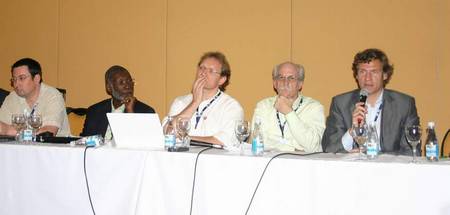Der Workshop „Broadening the Domain Name Space: Top Level Domains for Cities, Regions and Continents?” auf dem 2. Internet Governance Forum in Rio hatte über 100 Teilnehmer. Das zeigt, dass die Idee von Namensräumen für Gemeinschaften auf Basis ihrer Sprache, ihrer Kultur oder ihres Wohnortes sehr interessant ist. Wolfgang Kleinwächter hatte eine beachtliche Anzahl von bereits bestehenden und künftigen GeoTLDs versammelt. Vertreter von .eu, .cat, .asia, .africa, .mercosur, .lat, .baires, .gal, .eus, .nyc, .paris und .berlin waren nach Rio eingeladen. Auf der Konferenz haben sie ihre Projekte vorgestellt, ihre Erfahrungen ausgetauscht und das Thema in den größeren Konferenzzusammenhang eingebracht.

von links nach rechts: Sebastian Bachollet, .paris; Nii Quaynor, .africa; Werner Staub, CORE; Tom Lowenhaupt, .nyc; Dirk Krischenowski, .berlin
Podiumsdiskussion mit Nutzergruppen
Auf dem Podium waren neben uns die Vertreter der Interessen verschiedener Nutzergruppen vertreten. Der eco sprach dabei für die Internetwirtschaft und stellte auf dem IGF Details der Studie vor. Anfang August hatte er sie unter den Internetnutzern der größten deutschen Städte durchgeführt. Angesichts der Ergebnisse richtete Dean Ceulic vom eco den Appell an ICANN, kurzfristig mit der Einführung von GeoTLDs zu beginnen. Annette Mühlberg vom At Large Advisory Committee bei ICANN (ALAC) vertritt die Interessen der Zivilgesellschaft und der individuellen Nutzer. Sie hatte ein schriftliches Statement geschickt, das Wolfgang Kleinwächter vortrug. Darin forderte auch Mühlberg eine baldige Umsetzung von GeoTLDs. „In the light of the aim of ICANN to make the use of the DNS more user friendly, especially with respect to local needs, we appreciate initiatives for more localised top level domains – the more the better!”
Der Redebeitrag von .berlin
„Ladies and Gentlemen!
My name is Dirk Krischenowski and I come from Berlin in the Land of Ideas. In my speech today I will focus on a particular aspect of cityTLDs which might change the way we see cities, at least digitally, in the future. But let’s warm up with some basic information.
The world goes city!
Kofi Annan mentioned in 2004 that already half of the world’s population is living in cities; by 2030 2/3 will live in cities. This fast urbanization is a challenge for the development of the information society and for city governments and local administrations as well.
Within this realm the development of namespaces for cities is a logical consequence.
.berlin, the future namespace for Berlin and Berliners, is a project which has evolved to an initiative which is today based on the support of thousands of community members. They all do their part to bring .berlin to life.
When we started with .berlin we aimed to create local domain names to satisfy a demand from the Berlin community. Especially the Berlin based SMEs are the economic basis for the .berlin top-level domain.
Soon we realised that .berlin domain names will lead to a more intuitive and easier way. By this administration, businesses and citizens will communicate in the future.
After visiting some city conferences and reading some literature on the subject, we realised that a cityTLD has further dimensions beyond the creation of a local economic value chain for the Berlin community.
The keyword for city marketers is “Place Branding”. When talking with them, many realised immediately the potential a cityTLD will have for their city and its communication in the world.
Cities today have the need to find a “unique destination proposition” to compete with other cities, regions and even nations. “CityTLDs perfectly fit into this pattern of creating uniqueness for a city” was the conclusion the city officials made.
Just imagine billions of contacts annually a cityTLD creates for the city name when people using it for email and websites. By this CityTLDs perfectly fit into modern image and branding campaigns for cities.
But CityTLDs are also a powerful tool for the city’s internal marketing to administration, businesses and the citizens. This should not be underestimated.
The challenge for us in terms of “Place Branding” is, to deliver to the responsible city markting organisations concepts and ideas how the cityTLD and domain names like “I love dot berlin” or “visit dot berlin” create maximum branding value for the city and its citizens.
Saying this I would like to come back to what we do here in Rio:
At the IGF the .berlin initiative has 2 aims:
First – As the spearhead and frontrunner for cityTLDs we would like to discuss the benefits cityTLDs will bring to the information society in developed and developing societies. And we would like to share our experiences with the IGF participants and emerging cityTLD initiatives.
Our second aim is to sustain the future private sector management of the top-level domain space on a local and global basis. The private sector management has shown to be very effective and beneficial to the development of the information society locally and globally. The German .de and the .uk TLD are very good examples for this. We aim to follow this approach.
Thank you very much for your attention!”
